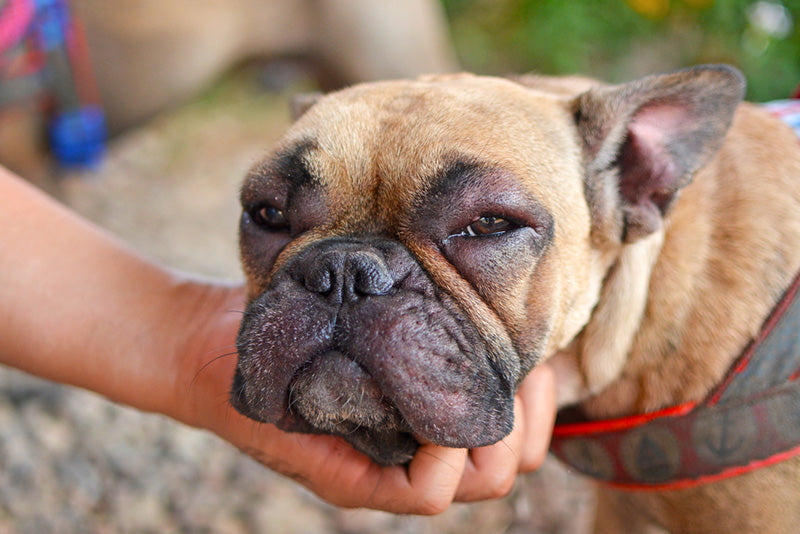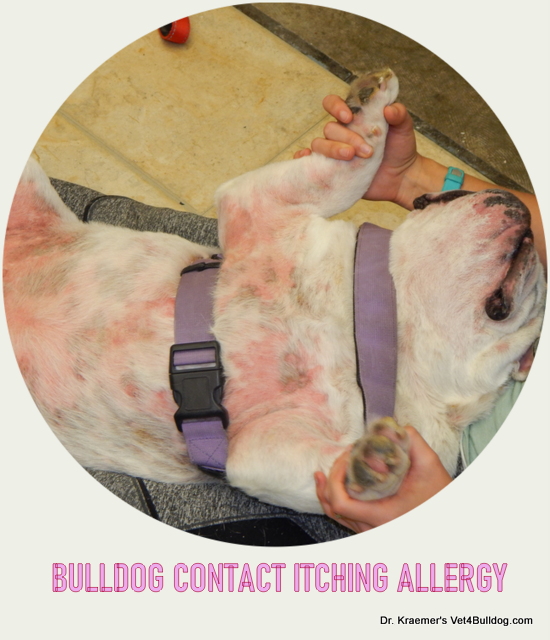Have you noticed your French Bulldog scratching incessantly or experiencing skin irritations? It might be more than just a little itch. French Bulldogs, like other dog breeds, can develop allergies. Yes, even those adorable and wrinkly-faced pups can suffer from allergic reactions. So, if you’re wondering, “Does my French Bulldog have allergies?” – you’re not alone. Allergies in French Bulldogs are a common concern among pet owners, and it’s important to understand the signs and causes of allergies in these beloved pets.
Allergies in French Bulldogs can be caused by a variety of factors, including food, environmental allergens, and even fleas. French Bulldogs can develop sensitivities to certain foods, such as grains or proteins, leading to itchy skin, ear infections, and gastrointestinal issues. Environmental allergens like pollen, dust mites, and mold can also trigger allergic reactions in French Bulldogs, resulting in symptoms such as sneezing, coughing, and watery eyes. Additionally, fleas and their saliva can cause severe itching and discomfort for these dogs. It’s estimated that about 10% of dogs have flea allergies, and French Bulldogs are not exempt from this problem. Managing your French Bulldog’s allergies may involve dietary changes, allergen avoidance, and regular flea prevention. Consulting with a veterinarian is crucial in determining the specific allergens affecting your furry friend and establishing an effective treatment plan.
If you notice your French Bulldog constantly scratching or experiencing digestive issues, they may have allergies. Common allergens for dogs include pollen, dust mites, and certain foods. Pay attention to any changes in their behavior or appearance and consult your veterinarian for a proper diagnosis. They may recommend allergy testing or a hypoallergenic diet to help manage your dog’s allergies and improve their quality of life.

Understanding Allergies in French Bulldogs
As a French Bulldog owner, you may have noticed that your furry friend sometimes exhibits unusual symptoms, such as itching, sneezing, or digestive issues. While these symptoms can be caused by various factors, one possibility to consider is allergies. Just like humans, French Bulldogs can develop allergies to certain substances in their environment or in their food. In this article, we will explore the signs and symptoms of allergies in French Bulldogs, common allergens, and how to manage your dog’s allergies.
Signs and Symptoms of Allergies in French Bulldogs
Allergies in French Bulldogs can manifest in different ways. Some of the most common signs and symptoms include:
- Itching and scratching
- Sneezing and coughing
- Vomiting or diarrhea
- Red, inflamed skin or rashes
- Ear infections
- Excessive shedding
If you notice any of these symptoms in your French Bulldog, it’s important to consult with your veterinarian to determine if allergies are the cause. Your vet may perform tests to identify specific allergens, such as skin or blood tests, to help develop a treatment plan.
Common Allergens for French Bulldogs
There are several common allergens that can trigger allergies in French Bulldogs. These include:
- Pollen from grass, trees, or weeds
- Dust mites
- Mold spores
- Insects like fleas or ticks
- Certain foods, such as grains, chicken, or beef
- Chemicals in household cleaners or grooming products
It’s essential to identify the specific allergens that affect your French Bulldog so that you can take appropriate measures to minimize exposure and manage their symptoms.
Managing Allergies in French Bulldogs
Once your French Bulldog has been diagnosed with allergies, there are several steps you can take to manage their symptoms:
1. Avoidance of Allergens
If you know the specific allergens that trigger your French Bulldog’s allergies, try to limit their exposure. This may involve keeping them indoors during high pollen seasons, regularly washing their bedding, and using hypoallergenic grooming products.
2. Dietary Changes
If your French Bulldog has food allergies, you may need to switch to a specialized hypoallergenic or limited ingredient diet. Consult with your veterinarian to determine the best dietary options for your pet.
3. Medications and Supplements
Your vet may prescribe medications or recommend supplements to help alleviate your French Bulldog’s allergy symptoms. Antihistamines, corticosteroids, and medicated shampoos are common treatments for itching and inflammation.
4. Regular Veterinary Check-ups
Regular check-ups with your veterinarian are essential for monitoring your French Bulldog’s allergies and adjusting their treatment plan as needed. Your vet can also provide advice on managing allergies specific to your dog’s situation.
Additional Considerations
It’s important to note that allergies in French Bulldogs are a life-long condition that requires ongoing management. While you may not be able to completely eliminate your dog’s allergies, with the help of your veterinarian, you can minimize their symptoms and provide them with a comfortable life. Remember to keep an eye out for any new or worsening symptoms and seek veterinary care if needed.
Conclusion
In conclusion, French Bulldogs can indeed develop allergies. If your furry companion is experiencing symptoms such as itching, sneezing, or digestive issues, it’s important to consult with a veterinarian to determine if allergies are the cause. Identifying the specific allergens and taking appropriate management steps can help alleviate your French Bulldog’s discomfort and improve their quality of life.
Additional Resources
For more information on allergies in dogs, including French Bulldogs, you may find the following resources helpful:
| Allergy Testing in Dogs: What You Need to Know |
| Allergy Management Tips for Dogs |
| Common Food Allergies in Dogs |
| Top 10 Hypoallergenic Dog Breeds |
Key Takeaways: Does My French Bulldog Have Allergies?
If you suspect your French Bulldog has allergies, here are some key takeaways to keep in mind:
- Allergies in French Bulldogs can manifest in various ways, including skin irritations, itching, and respiratory issues.
- Common allergens for French Bulldogs include pollen, dust mites, certain foods, and environmental factors.
- Consult with your veterinarian to determine if your French Bulldog has allergies and to develop a management plan.
- Treatment options for allergies in French Bulldogs may include dietary changes, medications, and allergy testing.
- Regular grooming and keeping your French Bulldog’s environment clean can help reduce allergen exposure.
‘Frequently Asked Questions’
Allergy is common among dogs, and French Bulldogs are no exception. If you’re worried that your French Bulldog may be suffering from allergies, it’s important to understand the signs and symptoms to provide the necessary care. Here are some frequently asked questions about allergies in French Bulldogs.
1. What are the common signs of allergies in French Bulldogs?
Common signs of allergies in French Bulldogs may include frequent itching, scratching, and biting of the skin, especially around the paws, ears, and belly. They may also experience redness or inflammation of the skin, hair loss, ear infections, and gastrointestinal issues such as vomiting or diarrhea.
Additionally, your French Bulldog may display symptoms like sneezing, coughing, watery eyes, and nasal discharge if they have respiratory allergies. It’s important to note that these symptoms can vary depending on the type of allergy your French Bulldog has.
2. What are the different types of allergies that can affect French Bulldogs?
French Bulldogs can develop various types of allergies, including food allergies, environmental allergies (such as pollen, dust mites, or mold), and contact allergies (such as certain fabrics or cleaning products). Identifying the specific allergy is essential in order to provide appropriate treatment and relief for your French Bulldog.
It’s best to consult with a veterinarian who can help determine the underlying cause of your French Bulldog’s allergies through diagnostic tests and recommend a suitable treatment plan.
3. Can allergies in French Bulldogs be prevented?
While it’s not always possible to prevent allergies in French Bulldogs, there are some measures you can take to minimize the risk or reduce the severity of allergic reactions. For instance:
– Feed a high-quality diet that meets all nutritional requirements for your French Bulldog’s specific needs.
– Keep your home clean and free from potential allergens like dust, mold, and pollen.
– Use hypoallergenic bedding and avoid harsh chemicals or cleaning products that may irritate your French Bulldog’s skin.
4. How can I treat my French Bulldog’s allergies?
Treating your French Bulldog’s allergies will depend on the type and severity of the allergy. Your veterinarian may recommend one or a combination of the following:
– Prescribing antihistamines or corticosteroids to alleviate the symptoms.
– Conducting allergy tests to identify specific allergens and implementing allergen-specific immunotherapy (allergy shots).
– Suggesting dietary changes or hypoallergenic food trials to manage food allergies.
It’s crucial to work closely with your veterinarian and follow their recommendations to provide the best care for your French Bulldog.
5. When should I seek veterinary assistance for my French Bulldog’s allergies?
If you suspect that your French Bulldog has allergies or if their symptoms are causing discomfort and impacting their quality of life, it’s important to seek veterinary assistance. Your veterinarian can accurately diagnose the underlying cause of the allergies and develop an appropriate treatment plan to alleviate your French Bulldog’s symptoms.
Additionally, if your French Bulldog experiences severe or sudden allergic reactions, such as difficulty breathing, facial swelling, or collapse, seek immediate veterinary care as these can be signs of a severe allergic reaction known as anaphylaxis.

In conclusion, if your French Bulldog is experiencing symptoms like itching, redness, sneezing, or gastrointestinal issues, it’s possible that they have allergies. It’s important to consult with your veterinarian to determine the specific allergen and develop a treatment plan.
Your vet may recommend a food trial to identify food allergies, or suggest allergy testing to pinpoint environmental allergens. Treatment options may include medication, diet changes, or allergen avoidance. With proper care and management, you can help alleviate your French Bulldog’s allergy symptoms and improve their quality of life.
